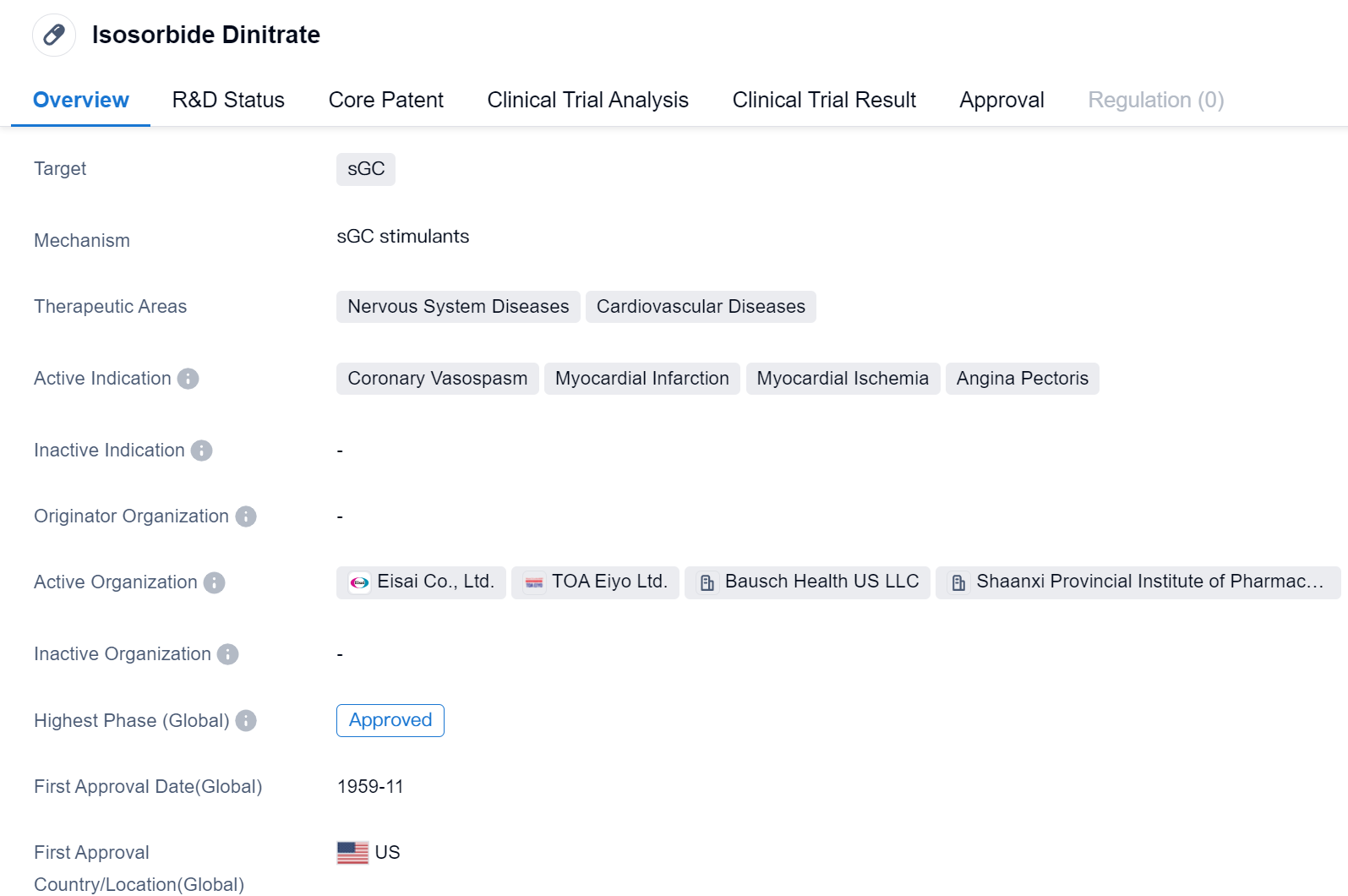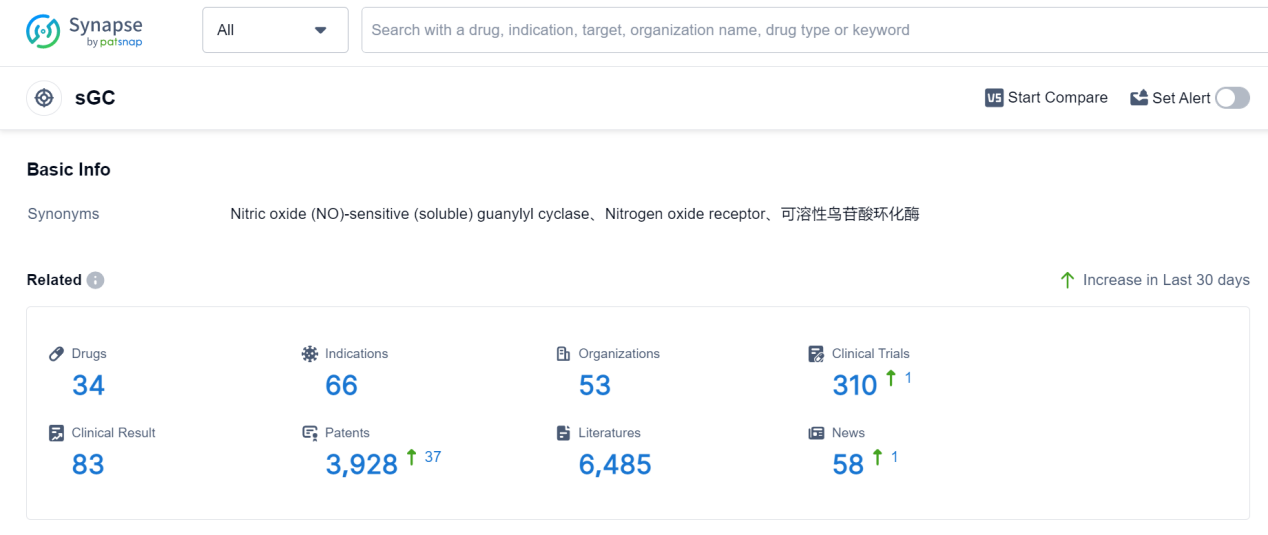Deep Scientific Insights on Isosorbide Dinitrate's R&D Progress
Isosorbide Dinitrate's R&D Progress
Isosorbide dinitrate is a small molecule drug that primarily targets the soluble guanylate cyclase (sGC) enzyme. It is used in the treatment of various nervous system and cardiovascular diseases. The drug has been approved for use in multiple indications, including coronary vasospasm, myocardial infarction, myocardial ischemia, and angina pectoris.
Isosorbide dinitrate is classified as a small molecule drug, indicating that it consists of low molecular weight compounds. This characteristic allows for easy absorption and distribution within the body. The drug primarily targets the sGC enzyme, which plays a crucial role in regulating the levels of cyclic guanosine monophosphate (cGMP) in cells. By activating sGC, isosorbide dinitrate promotes the production of cGMP, leading to vasodilation and improved blood flow.
The therapeutic areas in which isosorbide dinitrate is utilized include nervous system diseases and cardiovascular diseases. Nervous system diseases encompass a range of conditions affecting the brain, spinal cord, and peripheral nerves. Cardiovascular diseases, on the other hand, involve disorders of the heart and blood vessels. Isosorbide dinitrate is particularly effective in treating conditions related to coronary vasospasm, myocardial infarction, myocardial ischemia, and angina pectoris.
Isosorbide dinitrate has received approval for use in various countries. Its first approval date in the global market was in November 1959.
👇Please click on the image below to directly access the latest data (R&D Status | Core Patent | Clinical Trial | Approval status in Global countries) of this drug.
Mechanism of Action for Isosorbide Dinitrate: sGC stimulants
sGC stimulants refer to a class of drugs that target and stimulate the soluble guanylate cyclase (sGC) enzyme. From a biomedical perspective, soluble guanylate cyclase is an enzyme found in various tissues, including blood vessels, and plays a crucial role in regulating the production of cyclic guanosine monophosphate (cGMP).
sGC stimulants work by binding to the heme group of the sGC enzyme, leading to an increase in the production of cGMP. This, in turn, promotes the relaxation of smooth muscles, particularly in blood vessels, resulting in vasodilation. Vasodilation helps to lower blood pressure and improve blood flow.
By stimulating sGC, these drugs can be used to treat conditions such as pulmonary arterial hypertension (PAH) and chronic thromboembolic pulmonary hypertension (CTEPH). They help to relax the pulmonary arteries and decrease the resistance to blood flow in the lungs, thereby improving symptoms and exercise capacity in patients with these conditions.
It is important to note that sGC stimulants should be used under the guidance of a healthcare professional, as they may have potential side effects and drug interactions.
Drug Target R&D Trends for Isosorbide Dinitrate
sGC, or soluble guanylate cyclase, is an essential enzyme found in the human body that plays a crucial role in various physiological processes. It is primarily responsible for converting guanosine triphosphate (GTP) into cyclic guanosine monophosphate (cGMP), a secondary messenger molecule. cGMP then regulates numerous cellular functions, including smooth muscle relaxation, platelet aggregation, and neurotransmission. Activation of sGC is triggered by nitric oxide (NO), which binds to the enzyme and enhances its catalytic activity. Dysregulation of sGC signaling has been implicated in various diseases, making it an attractive target for pharmaceutical interventions aimed at modulating cGMP levels and restoring normal cellular function.
According to Patsnap Synapse, as of 7 Sep 2023, there are a total of 34 sGC drugs worldwide, from 53 organizations, covering 66 indications, and conducting 310 clinical trials.
👇Please click on the picture link below for free registration or log in directly if you have a freemium account, you can browse the latest research progress on drugs, indications, organizations, clinical trials, clinical results, and drug patents related to this target
Conclusion
In summary, isosorbide dinitrate is a small molecule drug that targets the sGC enzyme. It is used in the treatment of nervous system diseases and cardiovascular diseases, specifically for indications such as coronary vasospasm, myocardial infarction, myocardial ischemia, and angina pectoris. With its approval in multiple countries, isosorbide dinitrate has established itself as a reliable and widely used medication.






